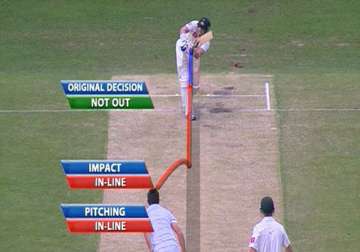New Delhi: The controversial decision review system (DRS) might come under scrutiny when ICC chief executives' committee (CEC) meets in Dubai on September 16 and 1 to discuss the playing conditions at the 2015 World Cup.
There is a news doing round that the meet will see a divided house with England and Australia joining hands to take on the other front led by India with support from the sub-continental neighbours – Sri Lanka, Pakistan and Bangladesh – especially on the topic of the referral system.
During the recent completed Shes series England and Australia both had bad experiences with DRS. Jonathan Trott was given out lbw on review at Trent Bridge despite an apparent edge, while Usman Khawaja's caught behind dismissal in Manchester during the third Test was upheld even though replays showed daylight between bat and ball. Hot Spot's inability to detect fine edges also created confusion, and towards the end of the series, its evidence was routinely ignored by the third umpire.
It is understood that David Collier, the ECB chief executive, and his Cricket Australia counterpart James Sutherland is expected to put forward a series of proposals at the CEC to make the DRS more consistent. Both members want to continue utilising the DRS in bilateral series despite its shortcomings.
During the latest Ashes, one visible hindrance to the DRS was the amount of umpiring errors. To remedy that, both England and Australia want the ICC to enhance the clarity in the communication between the third umpire and the on-field umpires.
India have been opposing DRS Saying that its not a full proof system. N Srinivasan, the BCCI president, had a separate meeting with the representatives of Bangladesh, Pakistan and Sri Lanka on the sidelines of the Asian Cricket Council held in Chennai on Saturday, to garner support.
The issue of use of two balls in ODIs may also come for discussion as Asian contries are not happy with this new rule which came into force from last October after the ICC Cricket Committee recommended it. All four Asian countries believe such a rule has proved to be deterrent to their slow bowlers. Not just India, a team like Sri Lanka is heavily reliant on its slow bowlers and is opposed to the two-ball rule only because the hard ball does not allow the spinner to grip the seam properly. Bad light is another topic member countries are concerned about and there is supposed to be unilateral appeal to the ICC to change the playing conditions to make use of the floodlights at grounds wherever available.
